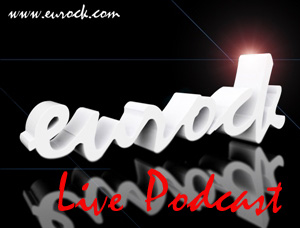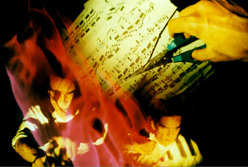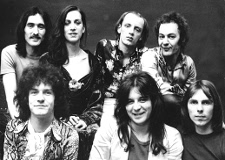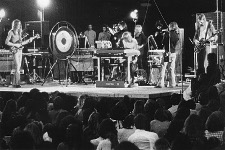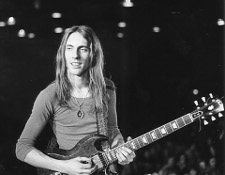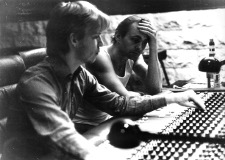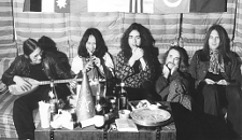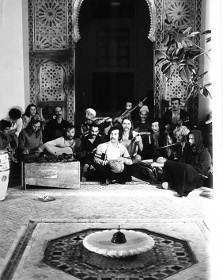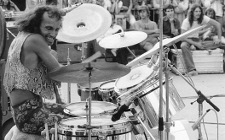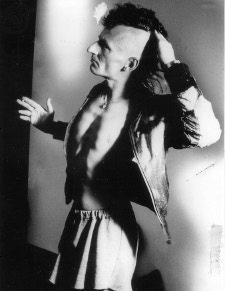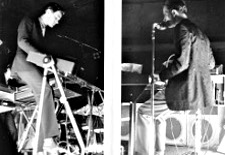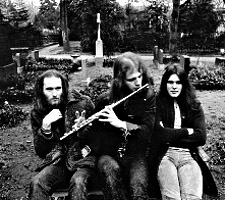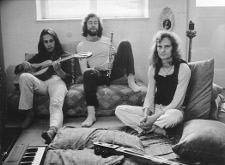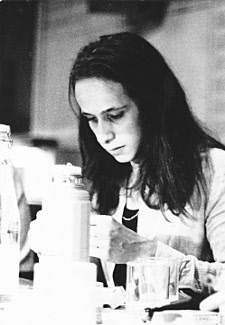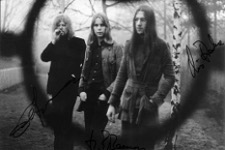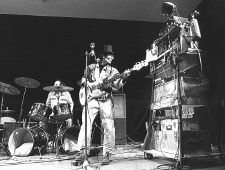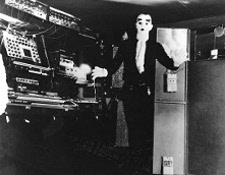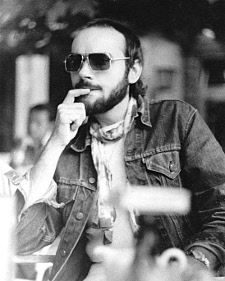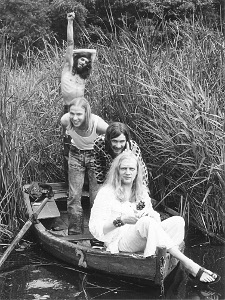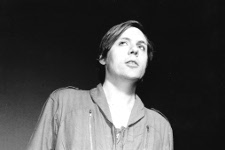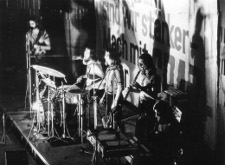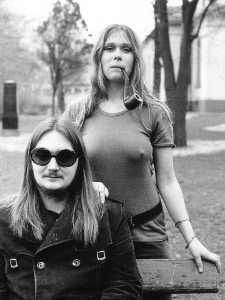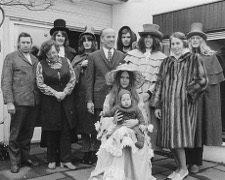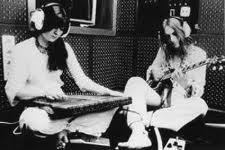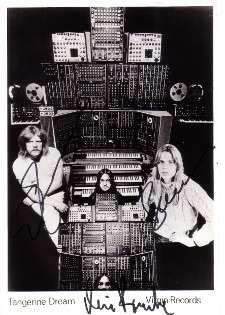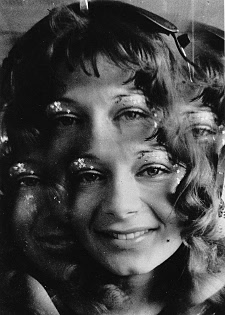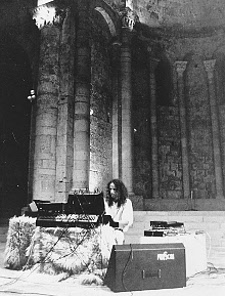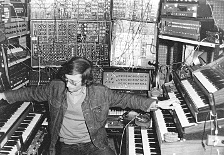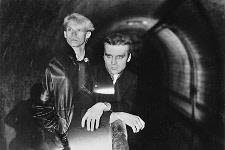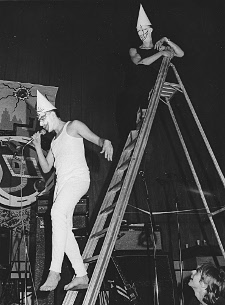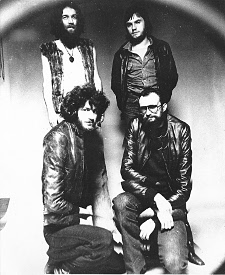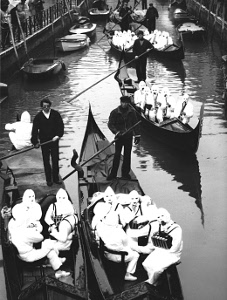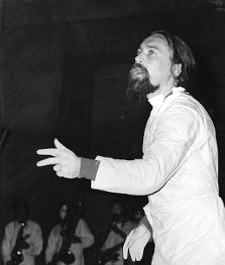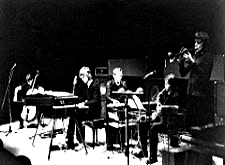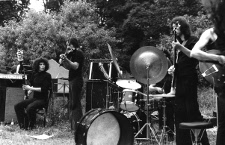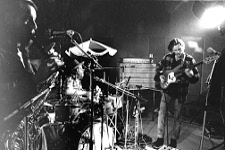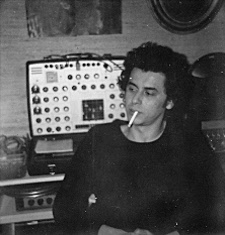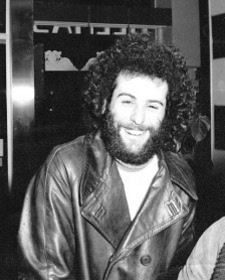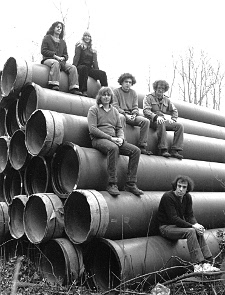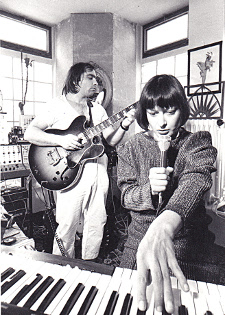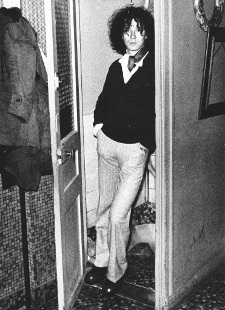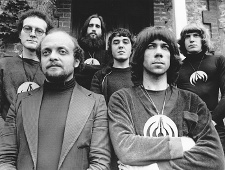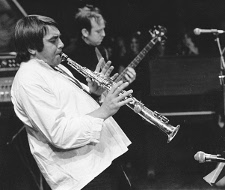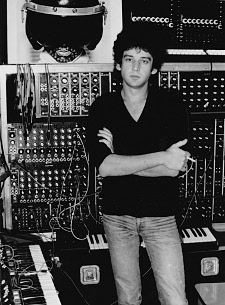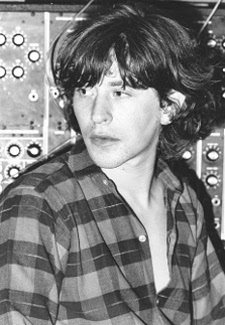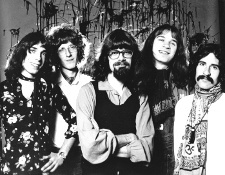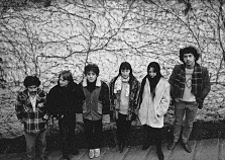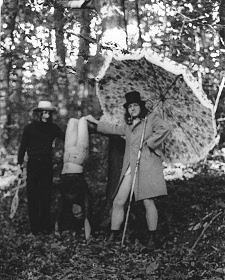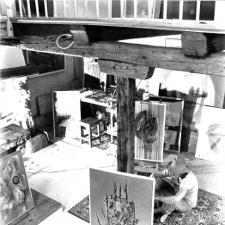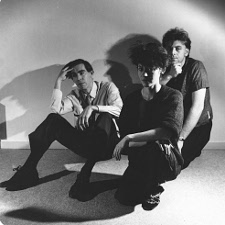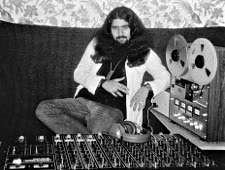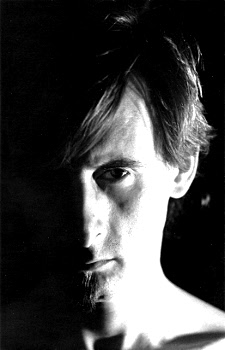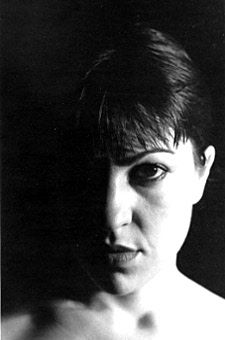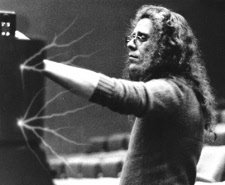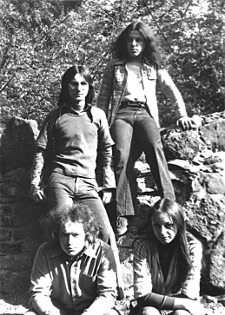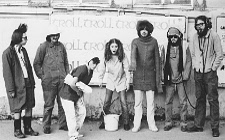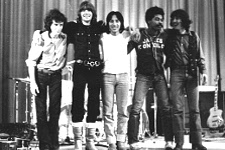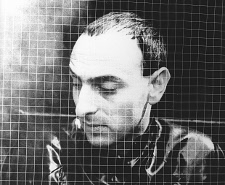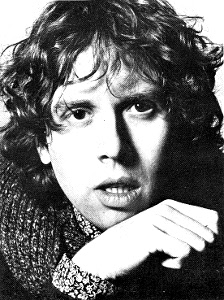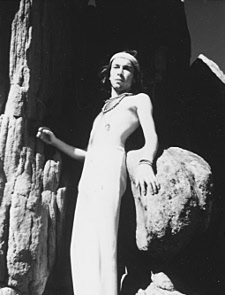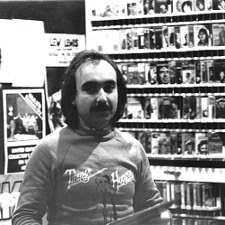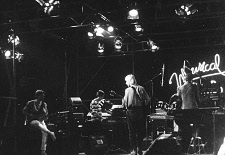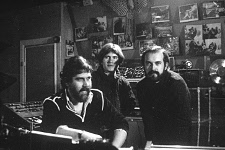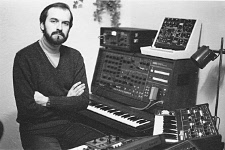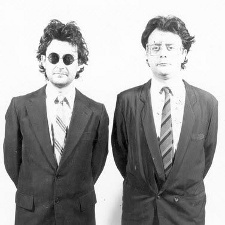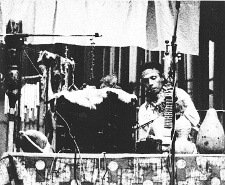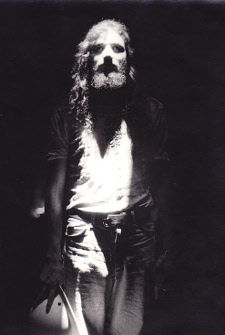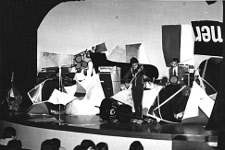The Story so far...
1970's- FM radio, Alternative Magazine & 1st US Indie Distributor of Euro Rock
1980's- D.I.Y. LP + Cassette & CD label
1990's- Distribution via the WWW
2010- Eurock.com ~ Multimedia Podcasting, Interviews & Reviews.
Label & Artist Submissions Accepted for Review...
Klassik Krautrock
Artistes Français
|
|
Electronic Music In Russia
The following Interview with Edward and Artemiy Artemiev was done in the latter part of 2001. It presents a fascinating and rather comprehensive look at the careers of both musicians, and in addition the beginnings and history of Electronic Music in the USSR (now Russia). I had certain preconceptions when I submitted the questions, and many of them proved to be correct, but many as well turned out to be quite mistaken. Artemiy was so kind as to do translation of much of this interview, as well as provide me with much additional help and information. As the final form of the interview came together I was rather astounded at how it portrayed a quite different way in which their own form of E-music came into being, and the dynamic of the society in which it emerged. In many ways their process of making music was/is quite different than the way music is made in the Western world. I was equally amazed as they described the ways in which they discovered, and formed a very personal bond with the newly discovered artists and sounds they were experiencing in the early years. Their experiences flashed me back to how that very same personal process unfolded for me, and others I know here in the West. I have always felt that music was one of the strongest bonds that people all over the world could share with each other. It was an International language of sorts that could form cultural and social linkage no matter how disparate the countries and peoples might be. Now when reading this piece I see that I was indeed right. Artemiy, many others and myself have come to a similar place, by different routes perhaps, but ended up sharing a love for a certain sound, series of notes and colorful tone clusters. Music has brought us together, and every time we listen we are all one.
Edward & Artemiy Artemiev INTERVIEW
Q-Edward: When did you first started making electronic music in the USSR? It was a long time ago in 1960, right after my graduation from Moscow Conservatoire, I met Eugene Murzin an outstanding inventor, creator of the unique photo-electronic synthesizer ANS (one of the first synthesizers in the world) and founder of the first experimental studio of electronic music in Moscow. This particular meeting predetermined my further creative destiny. A talented scientist and passionate music lover, E. Murzin became my teacher in electronics and acoustics; he introduced me to exact sciences, electronic technology, the practice of stereo sound recording. We can say, that the history of Russian electronic music began by putting into practice Murzin’s electronic device – the ANS synthesizer, named after the famous Russian composer A. N. Skriabin. Eugene finished construction of his apparatus in 1955. Composer A. Volkonsky made the first creative experiments on ANS in 1958, and O. Buloshkin, A. Nemtin, S. Kreichi, S. Gubaidullina, A. Schnitke, E. Denisov, Sh. Kallosh and myself continued working a little bit later with the synthesizer. E. Murzin called the ANS “a photo electronic optical synthesizer of sound”. It is based on a photo electronic device. The photo electronic principle of synthesis, used by E. Murzin, implies the graphic imaging of soundings on a special plate, covered by a solid layer of black colour, which he has very exactly called “the score”. Before the composer is a row of levers, on the end of each one of which is a chisel. In the necessary places the colour can be removed (with the chisels), and then one can create a system of breaks in a definite configuration: a richer sound requires drawing a line (instead of a point), and a chord required putting several points in different places. Working this way, breaks, points and lines serve to create a regulation of the brightness of light rays, directed onto photo elements through rotating discs – frequency modulators. Due to this effect of light there appears electric current, which was later transformed into real current. “The Score” also played a role as operative memory, letting the composer make various changes in the character of created sound signals, i.e. to correct the sound picture in accordance with the author’s ideas. The optical sound generators of the ANS synthesizer (their are 720 in number) make it possible to obtain 720 sinusoidal tones and compose from them oscillations having any level of complexity. The main sound range of an instrument is a division of the octave into 72 steps (144-step temperation was also possible). Practically having no temperation, ANS exceeds most commercial synthesizers of that time (for example, module synthesizers of the MOOG type) by its unlimited polyphony, and possibility of strictly scientific synthesis (if you know the spectral composition of the timbre, it could be exactly reproduced on the keyboard of the device). A composer, working on the score of the synthesizer, is like a painter; he paints, retouches, erases and deposits coded pictures, immediately creating auditory control over the result. The sounds are completely unusual as a result of their spectra on the glass of the score. The device, which has a memory system, can remember these elaborations, so they can be used again later. Having no limitations in the timbres and their changes, ANS makes it possible to use artificial voices and noises of various constructions in the work. The first thing I did when I started working on the ANS was record several of my compositions for piano on this grand apparatus and believe it or not, it was a real miracle when the graphics began playing sounds. My first piece composed especially for ANS and performed on this particular synthesizer was “Star Nocturne” (1961).
Q-E: At the time you began I think electronic music was not well known even in the Western world. What were the early influences for you musically that led you to create this new form of music using some of the first electronic instruments? I would divide into three parts the nature of the music in its present state. There is a large, perhaps the main group of musicians, composers and artists, who have had traditional training, and experience in an academic school. There are a lesser number of musicians, who are making their creative search in a completely different area – electronic music; for the most part they do not come into contact with the academic school. The third part is rock-musicians. So it happens, that the “academic” musicians are virtually unaware of the events taking place in the “electronic” area, for them it does not exist, they neglect it or are only making some timid attempts in this area. However – and this is already quite clear – during the last twenty years electronic music has become like an avalanche, and one can not just ignore this fact. On the other hand, the musicians and more often technicians – engineers, who deal with new electronics in its extreme form –the avant-garde –, do not look for contact with the traditional academic schools. It is like two opposite poles. As for rock-musicians, they use both approaches, but in a definite context. I consider, that a true new music – perhaps the primary new one – will appear as a result of the combination of electronics (I mean not only the instruments, but also new acoustics, and all the other things which electronic technique will give us), and the academic school, traditional acoustic instruments. For me, this is the main direction, and it may absorb all the rest, depending upon the personality and conception of either, one or another author. Creative work in the field of electronics is in many respects indebted to rock music due to the interest among the musicians, because of its energy, its lively sounding, and very emotional range. I had a good academic school education. But upon experiencing the opera “Jesus Christ Superstar”, that became a decisive factor for me (I consider this opera as one of significant phenomena of the 20th century). I can say that I was formed as a composer in many respects thanks to rock music. There were practically no electronics in that opera, but there was a completely different vision embodied in its use of traditional Biblical themes, which were previously only embodied musically in academic ways, beginning with the works of Claudio Monteverdi, or maybe earlier, and concluding with Shoenberg’s works (“Aaron and Moses”). I have always felt they lacked a certain sort of creativity, a more open emotional string, power and energy. All this I heard in rock music, and this really shook me. Rock music has taught me not to be ashamed of emotions – you do not need to hide them! Rock musicians have created a principally new “sound” – a brighter one, with shining arrangements, like melted gold – this is my perception. Now it lives in my sub consciousness, which is very important for my creative work. There were two turning points in my music career. The first one was in 1958 when I heard the composition “A Hammer Without Master” by Pierre Boulez. It impressed me greatly and created a desire in me to discover different sound spaces. The second was at the end of 1960’s when I heard the music of such rock groups as Pink Floyd, King Crimson, Genesis, Yes, Gentle Giant, Led Zeppelin. In general rock music influenced me greatly. Under its influence I composed the cantata “Ode to Herald of Good”, which was commissioned by the Olympic Committee for the opening ceremony of Olympic games in Moscow in 1980, also a cycle of instrumental-vocal poems “The White Dove”, a symphonic picture “Ocean”, a/o… In my compositions I often use instruments and a style of presenting sound material from the “arsenal” of rock music. Even more I use all this stuff for film music (soundtracks). If we add to this mixture my electroacoustic predilections then I can say that I exist in some three-dimensional musical space. I think that this helps me to work with such absolutely different film directors as Andrey Tarkovsky and Nikita Mikhalkov. Q-E: How did you manage to get access to equipment and recording facilities back then? My familiarization with electronic music has coincided with the appearance of the first synthesizers and I have come rather a long way from “drawing” sounds on the ANS and exploring analog keyboards like the Moog to computer technologies and it’s impossible for me to prefer this or that period in my activity because the process of composing electronic music depends on the unique individual opportunities offered by the apparatus you’re playing and working with. Two-dimensional fields of performance and synthesis of sound appear while you are working on the ANS and this particular field allows the author to see his composition wholly in its dynamic and spectral structure. All of this is united in performance macro graphics, and I must say that the opportunities of editing here are great. (Recently I visited a laboratory, where the ANS stands and became convinced that the possibilities of this machine are far from being exhausted.) As for analog synthesizers, I can say that the attractive qualities of analog synthesizers are both the special qualities of the sound, and a very convenient, accessible and evident way of real time control. And, lastly, computer technologies step by step assimilate all achievements in the area of electronic music by uniting them in a system that controls the synthesis of sound, space and performance. The shortcoming of this technology (I hope a temporary one), I consider to be the excessively complicated, multi-stage and labor-intensive programming access to all elements that form the nature of sound, its synthesis, editing, processing, etc. The field of electronic music extends endlessly and this process is irreversible. It absorbs everything that is connected to a sound. Today, when we speak about the modern music environment, we mean thousands of schools, musicians, and currents, directions that are separated from each other and mostly disorganized. I think, that now the means and technology of electronics are capable again to unite them all in one powerful river – a river of music. As it was in Mozart’s times, now there is the possibility for a truly new music, as music has always been born hand in hand with the developments in new technologies. Thus, for example, Bach’s music became possible thanks to the tempered clavier. Really, amazing changes have taken place in this sphere for more than 50 years. Having begun my involvement with laboratory research in the field of synthesis of sound, we now have such technology and tools that can allow us to solve any creative task. Moreover I think that the present level of technology and engineering outstrips the most courageous imaginations of musicians. So now a composer again has appeared as though before a clean sheet of a musical paper. There is an infinite creative sphere that lies ahead. All you have to do is to create. Everything is possible here. Q-E: What was the relationship between the government and arts/music scene in those days? It seems to me the Soviets might have considered music, as a form of bourgeois entertainment and not liked it – was this true? Musical life in the former Soviet Union during the Brezhnev regime was supervised, but not as strictly as literature, painting, theatre and cinema. Musicians pretty much had access to the complete spectrum of information that occurred in other countries. We could order via Soviet people working abroad - notes, LPs, books on music and the government didn’t pay any real special attention. Even some so-called “home-clubs” of various music orientation (avant-garde, jazz, rock and classical music) appeared in Moscow at the end of 1960’s. It happened because average people couldn’t afford to buy highly quality equipment and LPs of foreign musicians. Such LP’s cost 50 rubles per copy, which was practically a half of the average salary of the engineer of those years (the salary of the average Soviet citizen was 110-120 rubles.) The Soviet government, management of the country, and its various institutes supported those musical directions and styles, which are based only on classical traditions. That’s why only certain kinds of music were played, broadcast and propagandized on radio, TV and in concert halls. In Soviet times, jazz and rock music were always associated with bourgeois culture and that idea is well illustrated in the quote from the well-known Communist writer Maks Gorkiy: “Jazz – is music for thick people”, that was famous during the days of Soviet regime. Q-E: Was there such thing as a “commercial” market for music produced in those days? Were there record stores? Did the music get played on the radio? Of course there were no “commercial” markets during Soviet era at all. Even the concept of “the commercial music market” didn’t exist. The entire country worked and lived by “The Plan”, and the government for every five-year period created this Plan. By the same Plan, “Melodya” (our unique and only recording label in the country) could published and release only a strictly supervised amount of LPs and MCs, The Ministry of Culture bought only a certain amount of compositions, etc. So the state dictated styles, genres and direction of all musical production in the spirit of Marxist aesthetics. The state was the unique and only customer during the days of Soviet regime.
Q-E: I believe the record label Melodya was owned by the government. Was there any limits on what type of music could be released, or perhaps there was much more freedom of musical expression than I might imagine? Really, there was only one recording label in the country that published and issued music on LPs and MCs. Its name was “Melodya”, and the government owned it. The central office was in Moscow and it had branches in all Soviet republics. There was also a so-called “Arts Council” that gathered once a month to listen and select new compositions for publication on “Melodya”. In those times mainly classical music both domestic and foreign was issued on this recording label. I can’t say that they didn’t publish modern music at all. Sure they did, but they issued strictly limited editions of jazz, pop and, very rarely rock music. Such modern genres of music were considered to be alien music that carried a certain harmful ideological influence to the hearts and souls of Soviet working people. Q-E: After Glasnost, did the situation change radically in terms of more freedom for production, distribution and sale etc.? Two most important things happened during the period “Glasnost” – 1) The opening of the gates of information, and 2) The beginning of the opportunity to communicate freely in all areas of human activity. If “Perestroika” had never happened, then I’m sure that I would never have received an opportunity to work in Hollywood and to have lawyers and managers abroad. As for distribution and sales, I think that it’s better to ask my son Artemiy about this. He is doing a great job with his label “Electroshock Records” and he is doing it very well. Q-E: Do you still work on new music today, or do you leave that to your son Artemiy? “I’d Like to Return”, was my last composition in the field of electro-acoustic music. I composed and recorded it in 1993. Then I took an almost 10 year break from working in this genre to devote all my heart and soul to finishing an opera entitled “Raskolnikov”, based on ideas contained in the novel by F. Dostoyevsky’s “Crime and Punishment” which I completed in 2000. I consider it to be the major product of my life. Besides during this break I scored several Russian, American and European feature films. But, perhaps, the main explanation of my temporary withdrawal from the electro-acoustic music scene was the necessity for me to make an assessment of my past methods of working musically and prepare for the new projects that I will undertake in the future in an area connected to audiovisual performances.
Q-Artemiy: At what age did you get interested in your father’s music? I was interested in my father’s music since my birth. In 1966 (the year when I was born) we lived in a small one-bedroom apartment, my father, my mother, my grand mother, a concert “Steinway” grand piano & myself. As you know my father is a composer & my mother (I think you don’t know this biographical fact) is a professional pianist. So I was listening to music all day long. I listen to my father’s music & classical music of various composers performed by my mommy. My favorite place was under the “Steinway”. I made a playground there & liked to listen to the music under it. You know music sounds rather mystical if you listen to it under the piano. Have you ever tried this? To me I felt sometimes like “Alice in Wonderland”. On the one hand you are listening to the music, but on the other hand it’s not the music you are listening to, but the sounds under music. Yes, and maybe these sounds/timbres subconsciously appear in my compositions. We lived in this apartment till 1973 & then moved to a new three bedroom flat, leaving this apartment to my granny. She died there in 1982 & the Soviet government took it together with the “Steinway” grand piano. Where is this old “Steinway” now - nobody knows? Q-A: Were you able to study the way he recorded and experimented with music and go to the studio with him? You know my childhood was a very interesting period of my life. At the age of 7–8 I started visiting the Moscow Experimental Studio of Electronic Music, the meeting place of very interesting composers – my father, Vladimir Martynov, Alexei Rybnikov, Edison Denisov, Alfred Schnittke, Stanislav Kreitchi, Sofia Gubaidulina, Schandor Kallosh, Alexander Nemtin; musicians – Tatiyana Grindenko, Gidon Kremer, Alexei Lyubimov, brothers Sergei and Yuri Bogdanov; film directors – Andrei Tarkovskiy, Andrei Konchalovskiy (very young at those times) Nikita Mikhalkov; painters – Mikhail Romadin, Sergei Alimov, Vladimir Serebrovskiy, Pavel Anosov and quite many people who are well–known now in Russia & abroad. I was also lucky to meet there two famous men – Italian & American film–directors Michelangelo Antonioni and Francis Ford Coppola. In that studio the world felt absolutely different. It was the 1973–79 periods - “the scent of Soviet flowers” and in there, in the dark of the small hemispheric room amazing happenings went on. The music of Herebert Eimert, Luciano Berio, Yes, King Crimson, Genesis, Klaus Schulze, Tangerine Dream, The Who, UK, Isao Tomita, Karlheinz Stockhausen, Luigi Nono, Pierre Schaeffer, Gyorgi Ligety, Edgar Varese, Milton Babbit, Pierre Boulez, Francis Dhomont, John Cage, Pierre Henry, Earle Brown, York Holler, Takehisa Kosugi, Steve Reich, Henri Pousseur was played in this studio. And I must say that it was not just a simple listening to concerts played on the tape recorder with “son et lumiere” (sound and lights - which was very “cool” and avant-garde in those days). It was a detailed discussion of every musical composition. There were also performances of my father's band “Boomerang”, underground electronic music festivals and various informal art-rock events that also took place inside the building of the first Moscow Experimental Studio of Electronic music. A lot of people were coming and these gatherings were more like a Bolsheviks’ meeting at one of the secret addresses that was just about to be busted by the Tzarist secret service than a cultural “underground” arrangement. I was more than intrigued by the atmosphere of the place, people, music and while listening to the music of the above-named composers and to the discussions after, naturally, I was inspired by it and started getting more seriously interested in genres of electronic, electro acoustic and serious rock music. Moscow Experimental Studio became my first school of music. I saw how my father worked with the ANS synthesizer, SYNTHI-100 & I was amazed. For me it was pure musical magic combining different twinkling lamps, buttons, levers, meters. My father, surrounded by huge apparatuses, two sound engineers always wearing black clothes and heaving beards and long hair, smoke that comes from their cigarettes. There was loud very strange music in a dark basement where all these happenings frightened not only people who are used to this kind of music and atmosphere of the studios, but also local inhabitants & even policemen. There I first tried the ANS & SYNTHI-100 and made my first steps in the field of experimental-electronic music. Q-A: Did you have any formal music education? Yes, I graduated from Moscow High School of Music as a classical pianist. Of course the next step was the Conservatoire, but when one day I came to the concert of Sviatoslav Richter & saw him playing the piano I realized that I would never get to his level. So I went into rock music & played in various Moscow rock groups as a keyboard player. At the same time I entered Moscow Institute of Foreign Languages where I studied for five years & graduated with a Degree. Q-A: What kind of music did you listen to while you were young? Did you have access to American rock and roll? As I stated, I started with British progressive & art-rock, German “Krautrock” music & experimental electroacoustic music. You know it was difficult & dangerous during part of this period to get Western music into the former USSR. There was an iron curtain during this time & all Western-cultural-things were forbidden, but people tried to find a way out of this situation & practically every week someone would bring 8-10 new LPs to the Moscow Experimental Studio to listen & discuss the music. As I could remember there was no American rock and roll music among these LPs.
Q-A: Do you remember the first electronic music album you ever heard from the cosmic music scene? Yes, sure. It was the LP Picture Music by Klaus Schulze. I liked it very much. It really impressed me, though I was only seven years old. By the way there were several LPs that impressed me greatly in my childhood and influenced my future activity as composer & musician. These are: Lizard, Red & In the Court of Crimson King by King Crimson, Picture Music, Mirage & X by Klaus Schulze, Relayer by Yes, Rubicon, Ricochet, Stratosphere & Force Majeure by Tangerine Dream, Albedo 0.39 & Spiral by Vangelis, Quadrophenia by The Who, Seconds Out by Genesis. Ummagamma, Dark Side of the Moon & Animals by Pink Floyd & electroacoustic compositions by Karlheinz Stockhausen, Luigi Nono, Pierre Schaeffer, Gyorgi Ligety & Francis Dhomond. Q-A: Do you think you were more influenced by the work of your father, or by the electronic pop music experimentalists from the West? It’s rather difficult for me to give an answer to this question. I think that I collected & later assimilated into my style many different genres of music. I mixed them and created my own works based on these different music styles. I call it my “point of intersection”. In 1997 I produced a CD under that name. Q-A: Today I think the ways of production and music scene in general are much different in Russia than they were when your father worked. Where do you record your music, in a private studio or the same studio where your father used to? We have our own separate private studios where we work & record our compositions. I even have two studios - one for composing, recording and mixing, the other – for mastering CDs. Q-A: Do you own your own equipment, or use the some of the same equipment your father used? I have my own studio equipment and it differs from my father’s. Of course it’s not the best studio in the world, but it suits my needs. Q-A: How sophisticated is the studio and equipment you use today? Is it the latest type of synthesizers that are used in the West? This is the list of equipment that I have: Computer: Pentium 600 MHz, 128 RAM Sound card: Sonorus “STUDI/O” MIDI interface: Voyetra V24SM MIDI patch bay: Ensoniq KMX-8 Software: Steinberg Cubase Score VST-Version 5.0 Steinberg WaveLab-Version 3.03 Synchronizers: JLCooper Electronics “DataSYNC2”, Alesis “AI-2” Synthesizers: Roland JD-800; (my father has the same model) Roland XP-50 Roland MC-202 Alesis “Quadrasynth” Ensoniq SQ-80 Clavia “Nord Modular” (my father has the same model) Sampler: Ensoniq “EPS” with 4x memory expander 8-output expander Rhythm machines: Roland R-8; Korg DDM-220 Microphones: Shure BETA 58 Sound processors: Alesis “Midiverb”; Alesis “Midifex” Yamaha REV-7; Yamaha REV-500; Yamaha SPX-990 & Yamaha SPX-90II (my father has the same model) Digitech “DSP 16” Ensoniq “DP/4” (my father also has the same model) Equalizer: Studiotone 32x2 professional studio equalizer Mixer desk: Yamaha RM 2408 Monitors: Alesis “Monitor One” Digital recorders: Alesis ADAT (2 units); Fostex D-5 digital master recorder (DAT); Casio DAT DA R-100; Pioneer Compact Disk Recorder PDR-509 Other equipment: AKAI ME 25S midi programmable note separator; Fostex Compressor-Limiter 3070; Roland SBX-10 (sync box/converter) Q-A: I know there is an underground scene of younger bands and musicians today making electronic music in Russia. They send me their own privately made CDs. Do you ever play live performances, or have any connection to this scene? Unfortunately my music isn’t suitable for live performances & that’s why I never play live. What I do is tape concerts. I know about the existence of an underground scene in Moscow and many musicians send their tapes & CD-R's to “Electroshock Records” for possible publication on our label. I even received tapes from Ukraine, Belarussia, Lithuania & Estonia. But unfortunately this music doesn’t suit our label. They send us sweet “saccharine” new-age tunes or Schulze-Tangerine Dream-like sequences, or something that they called “experimental-synthetic music” based on preset timbres of their synthesizers (mostly Roland & Korg). It’s impossible for me to publish such kind of music on our label. Maybe it’s good, maybe it’s serious music by a new generation and I don’t understand it? I don’t know. I know only one thing – I must try and produce what I consider to be the best experimental, electro acoustic & avant-garde music it on our “Electroshock Records” label. Q-A: Does your music ever get played on the radio there? Yes, sure on radio & TV and quite a lot I must say. I also use a lot of music by the “Electroshock Records” artists in my radio-show, also called “Electroshock”. Q-A: What is the situation for promotion, sale and distribution of rock and electronic music today in Russia? Is it much different than it was for your father? I think that the situation with rock, electronic, experimental & serious music was much better during 1970-1990 and not only in Russia, but in the whole world. People could think, speak, write interesting books, shoot interesting films, and compose interesting music. They had inspiration; imagination & they were spiritually strong. Now it differs greatly as this is the time of a more modern-non-thinking-empty-soul-less culture where everybody can do what he wants and no one tells them that they are wrong because thousands of people do the same things. The new generation has no authorities. All you can hear now is ugly modern popular music that blares out of every discotheque & nightclub, music that is aggressive, de-constructive & so faceless that the sound of every other musician seems like the continuation of a song by a previous one. I also want to say some words about music scene in Russia & the Western countries. Now there’s no difference between the music scenes in Russia & the Western countries. Here what is popular, is what’s popular in the West – trance, hip-hop, rave, rap, house, etc. – in other words, non-thinking dancing styles of music. The mass media promotes only such types of music. It seems that the world has gone crazy. As for serious modern music I must say that the situation with electronic, electro-acoustic, contemporary, experimental & avant-garde music is very specific. People are interested in the above-mentioned genres of music. I can say this because of the positive reactions to my monthly lectures, radio & TV program on Moscow cable television (both programs have been very sporadic so far however because for my show I use only non-commercial serious music). Many people also complain that it’s practically impossible to get music of this kind in our country. Really, it’s very difficult to find CDs by Alejandro Vinao or Francis Dhomont, or Pierre Schaeffer for example. Right now “Electroshock” is working on the possibility of opening a special CD store where we’ll be distributing, selling & promoting only electronic, electro acoustic, experimental & avant-garde music. If everything works out OK, then we’ll open this particular CD somewhere at the end of autumn ’01. As for various events devoted to the above-mentioned non-commercial genres of music in Moscow I can say that once every three months the Russian Association for Electro-Acoustic Music stages concerts of serious electronic, electro-acoustic, experimental & avant-garde (EEE&A) music. Also we have the “Alternativa” festival devoted to EEE&A music, & besides that many interesting composers & musicians often visit Moscow for concerts & performances. Many people (by the way many young ones) attend these events. They’re sick & tired of techno, pop, rap, hip-hop & other pieces of commercial shit. They’re very interested in listening to & buying electro-acoustic, electronic, experimental & avant-garde music. Now the cultural situation in the world is very sad (our countries are not the exception). Few people want to read serious books, watch serious films, and listen to serious music. The motto of the younger generation is “switch on rap & I’ll cry”. Yes! They call rap or techno “the highest level of art” & we can see tears of joy on their faces while they listen to 120 beats per minute. When we ask them who are Michelangelo or Leonardo Da Vinci - they say, “Oh! I know! These are the names of the famous turtles, mutant heroes”. My God, it’s scary! And you’re speaking about development. Development of what? Degradation? I think so. What is going on with our poor planet, do you know, I don’t? Q-A: Culturally is electronic music (and rock for that matter) still considered Western and a corrupted form of art? No of course not. You can listen to whatever you want. Q-A: What is the life of a musician like now in Russia? In the Western press we hear stories all the time about how Russia is falling apart economically and the old CP has now become the new criminal mafia that controls all trade and commerce. Is it better now for an artist, or was it better before (if you can remember those times)? Russia lives by its own laws that differ greatly from the laws of other world. Unfortunately your press is right. Our economy is ruined after the crisis that we had in 1998, and of course we are economically falling apart. Now corruption & crime is everywhere. People even think that a new era of the KGB comes with Mr. Putin. The old Communist Party controls all trade and commerce since the end of Communist era and I think it’ll control every sphere of economy & business till the old-age leaders will die. Now Communists became so-called “Democrats”. They changed their color, but the mentality remained the same. Unfortunately our country is heading toward a global catastrophe & very few people understand that fact. We have no new resources; we can’t find money to repair the old equipment (we even don’t dream about buying new things), our gas tubes are damaged (I think that you heard about the natural gas crises in our Far-Eastern region), the metro areas (practically in every Russian city) need to be repaired. People can survive only in big cities like Moscow or St. Petersburg. If you go to the country, then you see that life there differs greatly from life in Moscow. There is terrible poverty in the countryside. P-O-V-E-R-T-Y. Imagine, the Salary of the average man in Russia is $100-150 a month, but you need at least $800-$1,000 per month to make both ends meet & to survive in the big city. Of course we have a lot of pirate markets in Russia. For example, if you want to buy a CD or a video in the CD-store you must pay at least $20 per CD there & if you go to the pirate marketplaces you’ll pay there $1-2, maximum $5 per CD. So it’s again the question of the wages you make. If you receive $100 per month and want to buy a CD – where will you go, to the shop, or to the pirate market? I think the answer is clear. We have two official pirate markets in Moscow “Gorbushka” & “Mitino”. There you can buy whatever CD, video or software you want. The price is $1 - $5 per CD or CD-R. When musicians from the Western countries come with to visit me I usually take them there and they are amazed with what they see and the rush to buy software-CD-R’s. Imagine! One CD-R with the following excellent programs - Steinberg “Cubase VST/32” v.5.01, “WaveLab” Ver. 3.03, “Recycle”. Ver. 1.71, “Cubase Score” Ver. 3.65, “Clean” Ver. 1.01, “Rebirth RB 338 with 3 additional Packs” Ver. 2.01, “Cubasis AV”, Cakewalk Pro Audio Ver. 9.03/Twelve Tone System, Cakewalk Overture Ver. 2.11, Style enhancer Micro Ver. 1.1, SoundForge Ver. 4.5h.402/Sonic Foundry, Logic Audio Platinum Ver. 4.2.2/Emagic, Sound Driver Ver. 2.06, Emagic Hearmaster.exe, T-Racks Ver. 1.1, Gigasampler Ver. 1.52 plus more then 300 plugins for various programs costs $2 per CD. As for your question concerning when was “it was better for the artist”, I can say that on one hand the life is obviously better now, but on the other hand, it’s not. Living is better now for those who play “Russian pop-music”, a certain style of “pop” that I’m afraid I can’t find any comparisons for. I don’t think you have such kind of genre in the West where people who play serious music are still trying to survive. Q-A: You have released quite a few productions on your label. I would think that perhaps your father worked with the aid of government grants? Do you get support from government arts subsidies like other artists in European countries do, or do you finance it all with your own money? I must say that you are a little bit mistaken thinking that my father is working with the aid of government grants. His main work is scoring for films and he never got any aid from the government. I don’t get support from government arts subsidies; I finance production of CDs from my own pocket. I’d love to get support from he government, or whatever (as it’s very hard to work with non-commercial music), but nobody gives it to me though the government loves to say that they “have an official organization and recording label in Russia that promotes various forms of modern serious music and culture.” That’s not true. Q-A: At one time in the West this type of electronic music was considered very revolutionary and “cosmic”. Now it is much more a result of production techniques controlled by the nature of the highly advanced technology and the state of the art studio equipment available. Do you have any conception of your music as spiritual, cosmic, and some kind of social expression? Or is it more a question of scientific sound exploration, based on the technology you have at your disposal? It’s difficult for me to speak about my music, so I leave this to critics. All I can say is that I have no so-called system of composing music. I combine the use samples, sonic textures & rhythm. I can say that I like to create atmospheres, but I try to create a particular atmosphere for this or that composition, not with simple preset timbres of the synthesizer like when you put your finger on the key, hear the sound changing through the LFO’s, ENV’s, OSC’s, DCA’s, etc. and exclaim – Oh, what a great cosmic sound I made by only pressing on the key! No, it’s not like this. I think that atmosphere is the combination of atoms of sounds created by you with the help of synthesizer, sampler, sound card of the computer & acoustic instrument, or human voice. You mix all the elements you need & begin working on it, creating your own specific sound to make people feel your composition with their mind and body. Technology only helps you to create the music you want. If your heart, soul & head are empty, then technology is useless. Q-A: Do you sell a lot of CDs around the world and make your living by doing this or have some other job as well? I compose music, scoring films and theatre plays, producing and selling CDs around the world, I’m producing radio and very sporadically the TV-program “Electroshock”, reading lectures, writing for the “Music Box” magazine (a big Russian music-magazine) where I’m heading the review department “Monitor” and making interviews with foreign electronic & electroacoustic musicians and trying to survive in this country. Q-Artemiy: What plans do you have for the future - an increasing number of productions, further collaboration with western musicians, soundtracks? Anything special? In summer of 2002 I’m planning to produce for the Electroshock Records label 10-12 new CDs, and stage the “First Russian International Festival of Electronic, Electroacoustic, Experimental & Avant-garde Music-Electroshock”. The CDs will be released to coincide with this. It is going to be a 10-day Festival of artists, musicians and media from all around the world scheduled for the end of July, early August 2002. Featured will be Edward Artemiev, Manuel Göttsching & Ash Ra Tempel, Art Zoyd, Hans-Joachim Roedelius, Tim Story, Michael Rother, Dieter Moebius, Mario Sch ő nwalder & Detlef Keller, Jeff Greinke, Matthias Grassow, Iasos, Andrew Poppy, Michel Huygen to name only a few. There will also be MANY MORE… The new CD productions scheduled as of now are - Artemiy Artemiev & Peter Frohmader: TRANSFIGURATION, Artemiy Artemiev & Phillip B. Klingler: A MOMENT OF INFINITY, Stanislav Kretitchi: VOICES & MOVEMENT, Anatoly Pereselegin: FASTGOD: E-PSALMS, Antanas Jasenka: DEUSEXMASHINA, Electroshock Presents: ELECTROACOUSTIC MUSIC VOL. VII, Oophoi: BARDO, Artemiy Artemiev & Christopher De Laurenti: 57 MINUTES TO SILENCE, Edward Artemiev: THREE ODES and Artemiy Artemiev & Karda Estra: EQUILIBRIUM. - Archie Patterson
|
 reviews features podcasts email bio
reviews features podcasts email bio